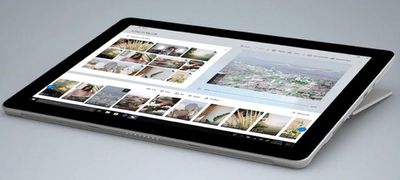Microsoft plans to launch a small foldable Surface tablet in the first half of 2020, according to Jeff Lin, an analyst at research firm IHS Markit.

In an email shared with Forbes citing supply chain information, Lin said he expects Microsoft to debut a Surface with dual 9-inch screens featuring a 4:3 aspect ratio.
Perhaps more interestingly, Lin also claims Microsoft's forthcoming next-gen Windows operating system, Windows Core OS, will be able to run Android apps natively. The new Surface will also apparently support Apple's iCloud services in Windows 10.
The device will also reportedly adopt an Intel 10nm Lakefield system-on-a-chip (SOC). Lin believes the dual-screen Surface could arrive as early as the first quarter of 2020, or by the first half of 2020.
Bearing in mind the problems that foldable displays have already presented for Samsung, it will be intriguing to see how Microsoft intends to implement a dynamic dual-display in a foldable tablet design.
Additionally, it's unclear how Microsoft plans to host its own Android App Store separate from the Google Play store, and how that would align with the company's existing Universal Windows Platform, which provides developers with a common app platform on every device that runs Windows 10.
Earlier this year reports began appearing that Microsoft is planning to launch a dual-screen mobile device, codenamed "Centaurus." The company even teased dual-screen Surface hardware in an all hands event for its devices team earlier this month, according to The Verge.
IHS Markit analyst Lin on Sunday also predicted Apple's MacBook plans for later this year, which are said to include a 16-inch MacBook Pro and refreshes for its 13-inch MacBook Pro sans Touch Bar and MacBook Air.






















Top Rated Comments
Keep on censoring, google.
Slightly different markets, I get that, but don't dismiss Microsofts hardware abilities.
Microsoft hitching its trailer to the Android horse makes sense, considering Apple’s move of iOS apps on MacOS. Otherwise, Microsoft wouldn’t have been able to stay relevant in the “Mobile first” future. Doing that Microsoft ensures that Windows and Android will remain ubiquitous, and the significantly larger number of Windows and Android users compared to macOS and iOS ... will be very happy with that integration.
It’s a win-win situation for the world’s most popular OSes, albeit an insecure one. It’ll be interesting to see how Microsoft handles security on this matter.